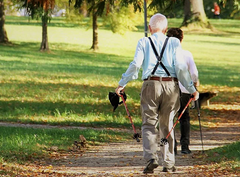Gesund altern - Wie man die Unabhängigkeit älterer Menschen im Freien unterstützt [19.02.20]
Mittels eines ökologischen Ansatzes zeigt eine aktuelle Hohenheimer Studie, welche unmittelbaren Umgebungsfaktoren beeinflussen, ob Ältere im Freien aktiv bleiben. Basierend auf einem Datensatz von mehr als 1000 Personen liefern die Autoren des Instituts für Gesundheitswesen und öffentliches Management interessante Erkenntnisse und konkrete Ratschläge für die Kommunalpolitik.
Schehl, B. & Leukel, J. (2020) Associations between individual factors, environmental factors, and outdoor independence in older adults, European Journal of Ageing
Affiliation: Institute for Health Care and Public Management, Faculty of Business, Economics and Social Sciences, University of Hohenheim, Schwerzstraße 35, Stuttgart, 70599, Germany
Abstract
The degree to which individuals can accomplish outdoor activity by themselves or require support is an important facet of successful aging. While prior research focuses on participation in outdoor activity, understanding of older adults’ outdoor independence is limited. We adopt an ecological approach to examine the role of individual factors and environmental factors in explaining outdoor independence. Our sample comprised older adults aged 65 + living in a medium-sized city in Germany (N = 1070). The results show that being male, younger, and healthier was positively associated with outdoor independence, while living together was not. Further, outdoor independence decreased with higher levels of perceived environmental barriers. This negative association was moderated such that it was stronger for the less healthy and older participants. Based on our empirical findings, we offer insights for policy makers, urban planners, and community groups to design age-friendly communities and consequently facilitate outdoor independence among older adults. © 2020, The Author(s).


